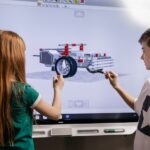Modern Education, Soft skills play a crucial role in today’s education system. While academic achievements are undeniably important, students need more than just theoretical knowledge to succeed in their personal and professional lives. The development of soft skills equips students with the necessary abilities to navigate the complexities of the modern world. This article explores seven key areas where soft skills hold immense significance in modern education.
In an ever-evolving and interconnected world, soft skills have become essential for students to thrive. These skills encompass various interpersonal and intrapersonal abilities that enable individuals to effectively communicate, collaborate, solve problems, and adapt to new situations.
Read More: How Robotics is Revolutionizing STEM Education: 5 Important Points
Explore the Contents
Communication Skills
Strong communication skills are fundamental in modern education. Students must be able to express themselves clearly, both verbally and in written form. Effective communication facilitates learning, builds relationships, and prepares students for future careers where interaction is crucial.

Collaboration and Teamwork
Collaboration and teamwork are essential skills in today’s interconnected society. Students often work in groups or teams to complete projects, solve problems, and generate innovative ideas. By developing collaboration skills, students learn to appreciate diverse perspectives, leverage collective intelligence, and achieve common goals.
Critical Thinking
Critical thinking is the ability to analyze information objectively and make reasoned judgments. In modern education, students need to go beyond rote memorization and develop critical thinking skills. This empowers them to evaluate and synthesize information, solve complex problems, and make informed decisions.
Problem Solving
Problem-solving skills enable students to tackle challenges, both in and out of the classroom. By cultivating a problem-solving mindset, students learn to approach obstacles with creativity and resilience. They become adept at identifying problems, brainstorming solutions, and implementing effective strategies.
Adaptability
In today’s fast-paced world, adaptability is a valuable skill. Soft skills enable students to embrace change, navigate uncertainties, and thrive in dynamic environments. The ability to adapt equips students with resilience, flexibility, and a willingness to embrace new technologies and ideas.
Emotional Intelligence
Emotional intelligence refers to the ability to recognize, understand, and manage one’s emotions and those of others. Developing emotional intelligence helps students cultivate empathy, build positive relationships, and effectively navigate conflicts. It also fosters self-awareness and enhances overall well-being.

Leadership
Leadership skills are crucial for students to succeed in their academic and professional journeys. Soft skills, such as effective communication, collaboration, and decision-making, contribute to the development of strong leaders. Students with leadership abilities can inspire others, take initiative, and drive positive change.
Time Management
Time management is a vital skill for students facing multiple responsibilities. Soft skills help students prioritize tasks, set goals, and manage their time efficiently. With effective time management, students can balance their academic workload, extracurricular activities, and personal commitments.
Creativity
Creativity fosters innovation and problem-solving. Soft skills empower students to think outside the box, generate unique ideas, and approach challenges with fresh perspectives. Cultivating creativity encourages students to embrace experimentation, embrace ambiguity, and find novel solutions to complex problems.
Modern Education, Conclusion
In conclusion, soft skills are invaluable in modern education. While academic knowledge forms the foundation, soft skills provide students with the tools necessary for personal growth, success in future careers, and adaptability in an ever-changing world. By focusing on the development of communication, collaboration, critical thinking, problem-solving, adaptability, emotional intelligence, leadership, time management, and creativity, educational institutions can better prepare students for the challenges and opportunities that lie ahead.
Read More: The Rise of Microlearning: Bite-Sized Lessons for Maximum Retention

FAQs
FAQ 1: What are soft skills?
Soft skills refer to a set of interpersonal and intrapersonal abilities that enable individuals to interact effectively with others and navigate various situations.
FAQ 2: Why are soft skills important in modern education?
Soft skills are important in modern education because they equip students with the necessary tools to succeed in their personal and professional lives. These skills enhance communication, collaboration, critical thinking, problem-solving, adaptability, emotional intelligence, leadership, time management, and creativity.
FAQ 3: How can soft skills be developed?
Soft skills can be developed through practice, experience, and targeted training programs. Engaging in group projects, participating in extracurricular activities, and seeking mentorship opportunities are effective ways to enhance soft skills.
FAQ 4: Are soft skills only relevant in educational settings?
No, soft skills are relevant in various aspects of life beyond educational settings. They are essential for career success, building relationships, effective communication, and personal development.
FAQ 5: Can soft skills be measured and assessed?
While soft skills are more subjective compared to hard skills, there are various assessment methods available to measure and evaluate them. These methods may include self-assessment, feedback from peers and mentors, and structured assessments designed to gauge specific soft skills.



